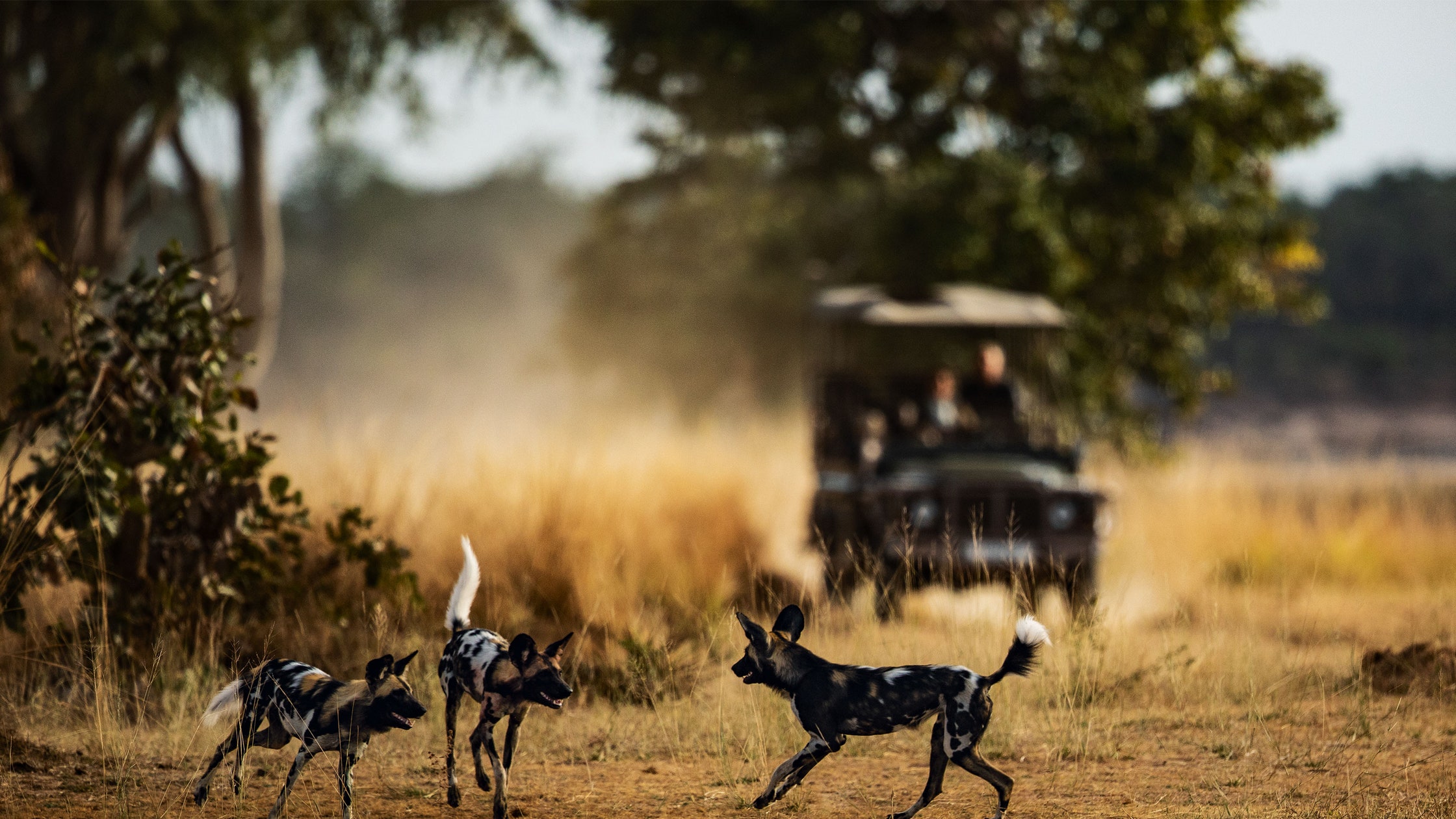Puku Ridge and Lolebezi: Luxury Safaris in Zambia
The elephants can’t see me peeking through a slit in a game hide. However, I can certainly see them; I’m so close I can see the crackled gold of their irises glinting in the fading evening sunlight. Just in front of me, a young female gloops forward in the knee-high mud, reaching out with her trunk to rip up fresh shoots of grass to munch. At the edge of the waterhole, a nursing mother drinks nervously, watching out for crocodiles as her calf demandingly pulls at her teats. A line of matriarchs slooshes their dusty hides with water. Then suddenly, they’re gone: sated, hydrated, washed and in search of a more protected place to continue their nocturnal feasting.
I could hang about for longer, listening to doves coo and ibises caw as the rose skies darken to lavender. Nonetheless, the mosquitoes have started to buzz, and it is time to ward them off with a quinine-rich cocktail and a slathering of citronella oil.
History of South Luangwa National Park
Half a century ago, South Luangwa National Park was formally established to protect a 3,494 square-mile game reserve in the east of Zambia. Visitors who survived the potholed dirt road from Lusaka, the capital, were housed in tents or simple rondavels. The area was primarily inhabited by pioneers like conservationist Norman Carr, who collaborated with local Chief Nsefu to set aside land for the country’s first safari camp in 1950. This initiative allowed villagers to earn income through tourism by providing wildlife experiences through photography rather than hunting.
Puku Ridge: A Luxurious Getaway
As I sip an icy G&T and savor smoked cashew nuts amidst lamplit trees on the wooden deck of the eight-room Puku Ridge, I can’t help but ponder what Carr would have thought of this luxurious lodge. Reopened in 2019 and operated by Chiawa Safaris, the lodge was designed by Luxury Frontiers, which has created tented camps for several highly regarded brands. The design brief was clearly to create a bush haven for safari enthusiasts who prefer comfort—inclusive of its owner, Zuneid Yousuf, a local magnate based in Dubai.
Set atop a rocky hill overlooking the rich grasses of the Puku Plains, the lodge is ideally positioned for both the ardent animal-lover seeking to spot leopards feasting in trees and dogs hunting in great packs, as well as for those who would prefer to watch wildlife from a plunge pool. In the afternoons, herds of strawberry-blonde puku mill about, nibbling on grass shoots, while baboons squabble amusingly amid the black-clay clods, picking seeds and eating insects.
Luxury and Comfort at Lolebezi
To conclude my adventure, I visited Lolebezi, located in Lower Zambezi National Park. Renowned for its beauty, this region is captivating, with sweeping views of the purplish-brown mountains to the north shimmering in the midday sun. Here, the Zambezi, one of Africa’s great rivers, flows lazily across the landscape, reflecting the magnificence of nature.
Designed by Fox Browne Creative, Lolebezi is a luxurious wildlife hotel that promotes a seamless connection with nature. The lodge is surrounded by breathtaking landscapes, with interiors featuring wood, thatch, copper, and exquisite design details that evoke the surrounding environment. Additionally, guests can relax while watching wildlife from a glass-walled gym or experience rejuvenating treatments at the spa.
Wildlife and Conservation
The wildlife diversity in these parks is remarkable, characterized by abundant lion, leopard, and wild dog populations. Project Luangwa and the Zambian Carnivore Programme play significant roles in conservation efforts, ensuring that the ecosystems of South Luangwa remain thriving sanctuaries for wildlife. The stories shared by guides about their encounters in the field highlight the delicate balance between conservation and community education.
In conclusion, exploring Puku Ridge and Lolebezi offers an unparalleled experience in Zambia’s wilderness, combining luxury with authentic safari adventures. This blend not only promotes enjoyment of the stunning natural environment but also supports the pivotal conservation efforts that ensure the wildlife thrives in its native habitat.
Plan Your Safari Experience
For those seeking to experience Zambia’s wildlife-rich parks, it is recommended to plan your itinerary well. Engaging with local conservationists and exploring both luxury accommodations and authentic experiences can provide deep insight into the beauty of Zambian wildlife and the critical conservation work being done.




